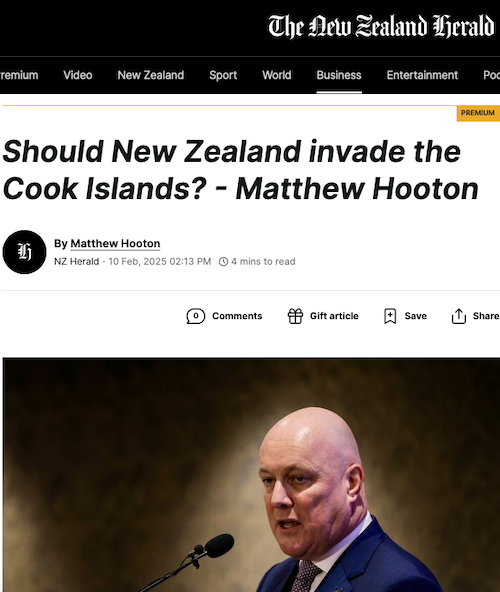COMMENTARY: By Eugene Doyle
The country’s leading daily newspaper, The New Zealand Herald, screamed out this online headline by a columnist on February 10: “Should New Zealand invade the Cook Islands?”
The New Zealand government and the mainstream media have gone ballistic (thankfully not literally just yet) over the move by the small Pacific nation to sign a strategic partnership with China in Beijing this week.
It is the latest in a string of island nations that have signalled a closer relationship with China, something that rattles nerves and sabres in Wellington and Canberra.
- READ MORE: Should New Zealand invade the Cook Islands?
- Cook Islands opposition files no-confidence motion against PM
- China: Cook Islands’ relationship with Beijing ‘should not be restrained’
- Cook Islands crisis: Haka with the taniwha or dance with the dragon?
- Explainer: The diplomatic row between New Zealand and the Cook Islands
- Cook Islands’ diplomatic snub to NZ will be noticed – commentator
- Mark Brown on China deal: ‘No need for NZ to sit in the room with us’
- No debt in China deal – Mark Brown
- Mediawatch: NZ media in the middle of Asia-Pacific diplomatic drama
- Other China in Pacific reports

The Chinese have politely told the Kiwis to back off. Foreign Ministry spokesperson Guo Jiakun told reporters that China and the Cook Islands have had diplomatic relations since 1997 which “should not be disrupted or restrained by any third party”.
“New Zealand is rightly furious about it,” a TVNZ Pacific affairs writer editorialised to the nation. The deal and the lack of prior consultation was described by various journalists as “damaging”, “of significant concern”, “trouble in paradise”, an act by a “renegade government”.
Foreign Minister Winston Peters, not without cause, railed at what he saw as the Cook Islands government going against long-standing agreements to consult over defence and security issues.

‘Clearly about secession’
Matthew Hooton, who penned the article in The Herald, is a major commentator on various platforms.
“Cook Islands Prime Minister Mark Brown’s dealings with China are clearly about secession from the realm of New Zealand,” Hooton said without substantiation but with considerable colonial hauteur.
“His illegal moves cannot stand. It would be a relatively straightforward military operation for our SAS to secure all key government buildings in the Cook Islands’ capital, Avarua.”
This could be written off as the hyperventilating screeching of someone trying to drum up readers but he was given a major platform to do so and New Zealanders live in an oxygen-starved media environment where alternative analysis is hard to find.
The Cook Islands, with one of the largest Exclusive Economic Zones in the world — a whopping 2 million sq km — is considered part of New Zealand’s backyard, albeit over 3000 km to the northeast. The deal with China is focused on economics not security issues, according to Cooks Prime Minister Mark Brown.
Deep sea mining may be on the list of projects as well as trade cooperation, climate, tourism, and infrastructure.
The Cook Islands seafloor is believed to have billions of tons of polymetallic nodules of cobalt, copper, nickel and manganese, something that has even caught the attention of US Secretary of State Marco Rubio. Various players have their eyes on it.
Glen Johnson, writing in Le Monde Diplomatique, reported last year:
“Environmentalists have raised major concerns, particularly over the destruction of deep-sea habitats and the vast, choking sediment plumes that excavation would produce.”
All will be revealed
Even Cook Island’s citizens have not been consulted on the details of the deal, including deep sea mining. Clearly, this should not be the case. All will be revealed shortly.
New Zealand and the Cook Islands have had formal relations since 1901 when the British “transferred” the islands to New Zealand. Cook Islanders have a curious status: they hold New Zealand passports but are recognised as their own country. The US government went a step further on September 25, 2023. President Joe Biden said:
“Today I am proud to announce that the United States recognises the Cook Islands as a sovereign and independent state and will establish diplomatic relations between our two nations.”
A move to create their own passports was undermined by New Zealand officials who successfully stymied the plan.
New Zealand has taken an increasingly hostile stance vis-a-vis China, with PM Luxon describing the country as a “strategic competitor” while at the same time depending on China as our biggest trading partner. The government and a compliant mainstream media sing as one choir when it comes to China: it is seen as a threat, a looming pretender to be South Pacific hegemon, replacing the flip-flopping, increasingly incoherent USA.
Climate change looms large for island nations. Much of the Cooks’ tourism infrastructure is vulnerable to coastal inundation and precious reefs are being destroyed by heating sea temperatures.
“One thing that New Zealand has got to get its head round is the fact that the Trump administration has withdrawn from the Paris Climate Accord,” Dr Robert Patman, professor of international relations at Otago University, says. “And this is a big deal for most Pacific Island states — and that means that the Cook Islands nation may well be looking for greater assistance elsewhere.”
Diplomatic spat with global coverage
The story of the diplomatic spat has been covered in the Middle East, Europe and Asia. Eyebrows are rising as yet again New Zealand, a close ally of Israel and a participant in the US Operation Prosperity Guardian to lift the Houthi Red Sea blockade of Israel, shows its Western mindset.
Matthew Hooton’s article is the kind of colonialist fantasy masquerading as geopolitical analysis that damages New Zealand’s reputation as a friend to the smaller nations of our region.
Yes, the Chinese have an interest in our neck of the woods — China is second only to Australia in supplying much-needed development assistance to the region.
It is sound policy not insurrection for small nations to diversify economic partnerships and secure development opportunities for their people. That said, serious questions should be posed and deserve to be answered.
Geopolitical analyst Dr Geoffrey Miller made a useful contribution to the debate saying there was potential for all three parties to work together:
“There is no reason why New Zealand can’t get together with China and the Cook Islands and develop some projects together,” Dr Miller says. “Pacific states are the winners here because there is a lot of competition for them”.
I think New Zealand and Australia could combine more effectively with a host of South Pacific island nations and form a more effective regional voice with which to engage with the wider world and collectively resist efforts by the US and China to turn the region into a theatre of competition.
We throw the toys out
We throw the toys out of the cot when the Cooks don’t consult with us but shrug when Pasifika elders like former Tuvalu PM Enele Sopoaga call us out for ignoring them.
In Wellington last year, I heard him challenge the bigger powers, particularly Australia and New Zealand, to remember that the existential threat faced by Pacific nations comes first from climate change. He also reminded New Zealanders of the commitment to keeping the South Pacific nuclear-free.
To succeed, a “Pacific for the peoples of the Pacific” approach would suggest our ministries of foreign affairs should halt their drift to being little more than branch offices of the Pentagon and that our governments should not sign up to US Great Power competition with China.
Ditching the misguided anti-China AUKUS project would be a good start.
Friends to all, enemies of none. Keep the Pacific peaceful, neutral and nuclear-free.
Eugene Doyle is a community organiser and activist in Wellington, New Zealand. He received an Absolutely Positively Wellingtonian award in 2023 for community service. His first demonstration was at the age of 12 against the Vietnam War. This article was first published at his public policy website Solidarity and is republished here with permission.

